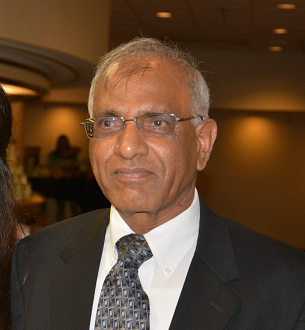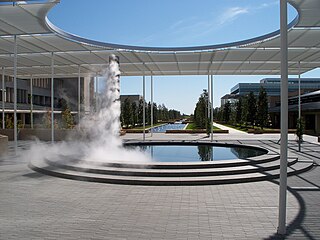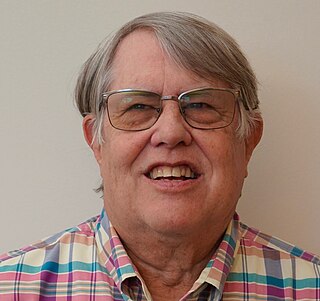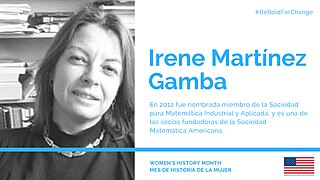
The Santa Fe Institute (SFI) is an independent, nonprofit theoretical research institute located in Santa Fe, New Mexico, United States and dedicated to the multidisciplinary study of the fundamental principles of complex adaptive systems, including physical, computational, biological, and social systems. The institute is ranked 24th among the world's "Top Science and Technology Think Tanks" and 24th among the world's "Best Transdisciplinary Research Think Tanks" according to the 2020 edition of the Global Go To Think Tank Index Reports, published annually by the University of Pennsylvania.

The Beckman Institute for Advanced Science and Technology is a unit of the University of Illinois Urbana-Champaign dedicated to interdisciplinary research. A gift from scientist, businessman, and philanthropist Arnold O. Beckman (1900–2004) and his wife Mabel (1900–1989) led to the building of the Institute which opened in 1989. It is one of five institutions which receive support from the Arnold and Mabel Beckman Foundation on an ongoing basis. Current research at Beckman involves the areas of molecular engineering, intelligent systems, and imaging science. Researchers in these areas work across traditional academic boundaries in scientific projects that can lead to the development of real-world applications in medicine, industry, electronics, and human health across the lifespan.

The Courant Institute of Mathematical Sciences is the mathematics research school of New York University (NYU). Founded in 1935, it is named after Richard Courant, one of the founders of the Courant Institute and also a mathematics professor at New York University from 1936 to 1972, and serves as a center for research and advanced training in computer science and mathematics. It is located on Gould Plaza next to the Stern School of Business and the economics department of the College of Arts and Science.
The Cockrell School of Engineering is one of the eighteen colleges within the University of Texas at Austin. It has more than 8,000 students enrolled in eleven undergraduate and thirteen graduate programs. Annual research expenditures are over $267 million and the school has the fourth-largest number of faculty in the National Academy of Engineering.
In 2005, the McMaster School of Computational Engineering and Science was the first program launched in Canada dedicated in developing expertise in the third wave of scientific research involving simulation, modeling and optimization. The new school brings together 50 faculty from engineering, science, business and health science to collaboratively conduct research and advance education.
John Tinsley Oden was an American engineer. He was the Associate Vice President for Research, the Cockrell Family Regents' Chair in Engineering #2, the Peter O'Donnell, Jr. Centennial Chair in Computing Systems, a Professor of Aerospace Engineering and Engineering Mechanics, a Professor of Mathematics, and a Professor of Computer Science at The University of Texas at Austin. Oden has been listed as an ISI Highly Cited Author in Engineering by the ISI Web of Knowledge, Thomson Scientific Company.

Thomas Joseph Robert Hughes is a Professor of Aerospace Engineering and Engineering Mechanics and currently holds the Computational and Applied Mathematics Chair (III) at the Oden Institute at The University of Texas at Austin. Hughes has been listed as an ISI Highly Cited Author in Engineering by the ISI Web of Knowledge, Thomson Scientific Company.

The College of Engineering (CoE) is one of the three undergraduate colleges at the University of California, Santa Barbara.

Junuthula N. Reddy is a Distinguished Professor, Regent's Professor, and inaugural holder of the Oscar S. Wyatt Endowed Chair in Mechanical Engineering at Texas A&M University, College Station, Texas, USA.[1] He is an authoritative figure in the broad area of mechanics and one of the researchers responsible for the development of the Finite Element Method (FEM). He has made significant seminal contributions in the areas of finite element method, plate theory, solid mechanics, variational methods, mechanics of composites, functionally graded materials, fracture mechanics, plasticity, biomechanics, classical and non-Newtonian fluid mechanics, and applied functional analysis. Reddy has over 620 journal papers and 20 books and has given numerous national and international talks. He served as a member of the International Advisory Committee at ICTACEM, in 2001 and keynote addressing in 2014.[2][3]
The National Institute for Mathematical and Biological Synthesis is a research institute focused on the science of mathematics and biology, located on the University of Tennessee, Knoxville, campus. Known by its acronym NIMBioS, the Institute is a National Science Foundation (NSF) Synthesis Center supported through NSF's Biological Sciences Directorate via a Cooperative Agreement with UT-Knoxville, totaling more than $35 million over ten years.

The University of Texas at Dallas is a public research university in the University of Texas System. The University of Texas at Dallas main campus is located in Richardson, Texas. The University of Texas at Dallas offers over 148 academic programs across its seven schools, including 57 baccalaureate programs, 59 masters programs and 32 doctoral programs, and hosts more than 40 research centers and institutes. The school also offers over 50 undergraduate and graduate certificates.
Robert D. Moser is an American Professor of engineering, noted for his studies of spectral methods, turbulence, and uncertainty quantification. He is the W. A. “Tex” Moncrief Jr. Chair in Computational Engineering and Sciences and is professor of mechanical engineering in thermal fluid systems at the University of Texas at Austin. Before coming to The University of Texas at Austin, he was a research scientist at the NASA-Ames Research Center and then a professor of theoretical and applied mechanics at the University of Illinois.

James R. Chelikowsky is a professor of physics, chemical engineering, and chemistry at The University of Texas at Austin. He is the director of the Institute for Computational Engineering and Sciences' Center for Computational Materials. He holds the W.A. "Tex" Moncrief Jr. Chair of Computational Materials.
Peter J. O'Donnell Jr. was an American businessman, securities investor and philanthropist. From 1962 to 1969, he was the Texas Republican state chair. In 1963, he was also the national chair of the Draft Goldwater Committee.
Todd Arbogast is an American mathematician. He is a professor of mathematics at the University of Texas at Austin, where he is a W. A. "Tex" Moncrief, Jr. Simulation-Based Engineering and Sciences Professor and Frank E. Gerth III Faculty Fellow. His research concerns the numerical analysis of partial differential equations.

Irene Martínez Gamba is an Argentine–American mathematician. She works as a professor of mathematics at the University of Texas at Austin, where she holds the W.A. Tex Moncrief, Jr. Chair in Computational Engineering and Sciences and is head of the Applied Mathematics Group in the Oden Institute for Computational Engineering and Sciences.
A Beckman Fellow receives funding, usually via an intermediary institution, from the Arnold and Mabel Beckman Foundation, founded by Arnold Orville Beckman and his wife Mabel. The Foundation supports programs at several institutions to encourage research, particularly the work of young researchers who might not be eligible for other sources of funding. People from a variety of different programs at different institutions may therefore be referred to as Beckman Fellows. Though most often designating postdoctoral awards in science, the exact significance of the term will vary depending on the institution involved and the type(s) of Beckman Fellowship awarded at that institution.

Rachel Ward is an American applied mathematician at the University of Texas at Austin. She is known for work on machine learning, optimization, and signal processing. At the University of Texas, she is W. A. "Tex" Moncrief Distinguished Professor in Computational Engineering and Sciences—Data Science, and professor of mathematics.

Yongjie Jessica Zhang is an American mechanical engineer. She is the George Tallman Ladd and Florence Barrett Ladd Professor of mechanical engineering and, by courtesy, of biomedical engineering at Carnegie Mellon University. She is the Editor-in-Chief of Engineering with Computers.
Deirdre Marie Shoemaker is an American astrophysicist whose research studies the mergers of binary black holes through both simulation and observation. She is a professor of physics at the University of Texas at Austin, where she directs the Center for Gravitational Physics and is affiliated with the Oden Institute for Computational Engineering and Sciences.











